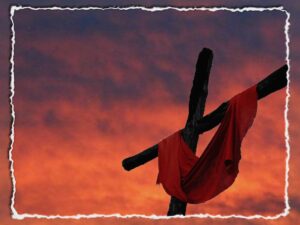A congregation of the United Church of Canada

Yr C ~ Lent 3 ~ Luke 13:1-9
In the 1992 Clint Eastwood movie “Unforgiven” a young man who has just killed a man says, “Well, I reckon he had it coming.” To this the grizzled old gun slinger played by Eastwood replies, “We all got it coming, kid.”
How do you feel about that? It’s a heavy question. The technical theological term for it is theodicy. Theodicy is about the question of how to reconcile the presence of evil in the world if God is supreme, omnipotent, omniscient. 
When bad things happen to good people is it a sign of God’s judgment?
When good things happen to bad people is it a sign of God dropping the ball?
Does God permit bad things to happen?
Cause them?
It’s a fundamental, core question that each of us has to answer for ourselves: what kind of god is the Holy Mystery we call God?
Jesus has a few thoughts on this! He tells us a couple of hot news stories in this passage. In one story we’re told that Pilate apparently (oh wait, it’s a news story – allegedly) killed some people while they were at worship.
Did they have it coming?
Did they die because they were worse sinners than other people?
Did God use Pilate as a tool?
Then there’s the story of an accident where a tower fell down and some people were killed.
Did they have it coming?
Or was it just terrible luck?
Is God pushing buildings over on people?
Is God standing by helplessly watching?
Jesus answers the questions plainly. He says no, God didn’t do this. That’s not the way God works. That is some bad, bad theology. Remember that next time some wild-eyed televangelist tries to blame some tragic event on sinful people.
Jesus. Says. No.
God does not will evil, permit evil, cause evil, use evil, or have anything to do with evil. God is love. Elsewhere Jesus says that the rain falls on the just and the unjust alike. But he doesn’t stop there. This isn’t a shoulder-shrugging fatalism that glumly endures whatever happens and renders God irrelevant.
The point is not to try to figure out why some folks suffer or die in certain ways; the point Jesus makes is that we’re all going to die – some naturally, some by violence, some by accidents. But instead of fussing about that Jesus says we should spend our energy on how we live!
Twice here in this passage Jesus calls us to repent. Now, that’s a loaded word for some people. It has been understood (and preached) poorly over time.
Repent means to have a change of heart, a change of mind. Literally it means to have a new mind. There is a turning, a change of direction, an end to one path in favour of a new path in God’s love. A deep personal relationship with the Sacred is neither fire insurance nor a protective bubble – it’s about being fully alive while we’re alive. It’s about abundant life in this life.
In Luke 13:3 and again in verse 5, Jesus says something very cryptic. About those tragic news reports, and friends we’re still being inundated with tragic news reports all the time – Jesus asks whether those folks had it coming.
His answer is: No, I tell you; but unless you repent, you will all perish as they did.
We get the repent part – to have a change of heart and mind. But what about that ‘if you don’t you’ll all perish as they did’ part?
Don’t take it too narrowly. Try this.
Bad things happen, sometimes by tragic accident, but more often by misguided people stuck in an unloving world-view.
I think Jesus is saying that unless you repent, and you, and you, and me, and everyone, that people will continue to perish in tragedy because the systems we’ve created that celebrate productivity, and ambition, and gain at whatever cost – the systems that oppress, discriminate, and exclude – the systems that favour power-over instead of power-with – that those systems are so broken that they will continue to break people over and over again.
Unless we all repent, unless we all get a firm grip on the Kingdom of God and God’s unconventional economy, unless we all have a change of heart and mind – people will continue to perish – crushed under the heels of a broken world-view.
And if you’re thinking that we don’t have the ability to change the hearts and mind of everyone, then Jesus suggests the way to begin is with yourself. To help us understand this Jesus tells a parable about a fig tree that doesn’t seem to be pulling its weight and the world’s judgment is that it should be cut down.
That’s kind of how our society thinks things are, isn’t it? Produce or you’re outta here! Contribute to society in a verifiably quantifiable equity-producing way or you’re worthless. That is the way of the world. That is the dominant world-view.
But Jesus offers a very different world-view.
Jesus says to the world, “Hold on a minute. Fruit doesn’t come on demand. If you just leave this tree on its own it may never produce anything fruity. If you want it to be the best it can be, you need to do something about it. Let’s dig around it a bit to loosen up the soil and let the nutrients in. Let’s add some manure (fertilizer) to give it what it needs to grow. With some time and some intentionality this tree will produce the fruit it’s meant to produce. But it may not be the fruit you think.”
Jesus puts those ideas on the lips of a metaphorical gardener. The temptation is to make this parable an allegory and assign meaning to the characters – like God is the vineyard owner judgmentally demanding fruit, Jesus is the gardener protecting us, and we’re the poor tree.
But I think that’s a very unhelpful and dangerous interpretation. It’s bad theology.
Here’s something I think is much more challenging, and hopefully useful.
I think we’re all three characters at once. Think about that!
The vineyard owner is our ego and pride wanting to feel important, and successful, and productive by the world’s standards, so we’re very hard on ourselves. We are all our own worst critics! We don’t need an angry and judgmental god – we’ve got that fully covered with our own ego!
The gardener is our spirituality – our journey toward openness, wholeness, fullness, and shalom. It’s the voice of hope and encouragement. It’s the thing that can quiet the ego and turn us on to Something More.
And the fig tree is our soul – our inner being. It’s the deepest part of us that bears the imprint of the image of God and is waiting to be shaped and formed into our best self.
Now, what does Jesus say we should do?
Tell our ego to cool it, there are more important things than ‘productivity’.
Tell our soul to hang in there – appropriate fruitfulness will come in time with the proper nurture.
And most importantly – tell our spirituality (our inner gardener) to do the hard work of digging, cultivating, and spreading manure!
Doing nothing changes nothing and accomplishes nothing. Hear me carefully here though. I am absolutely NOT saying that digging and manuring earns you anything.
I’m saying that depth requires effort and commitment. I’m saying that a relationship requires heart-ful participation from both parties – and if it’s a relationship with the Holy Mystery we call God you’re talking about you already know that God is all in and all love – so the only thing holding the relationship back is our side.
So what then should we do? What does digging and spreading manure look like – spiritually speaking? Well, in part it looks like this! Look where you are.
You’ve made the effort to come here, to join online, and participate today.
You’re doing the digging and I’m spreading the manure! ☺
In addition to this, some of you come to The Porch bible study each week. Some of you read daily devotional emails or booklets. Some of you have deep prayer lives. Some of you sing hymns or praise music beyond this place. Some of you are becoming great at saying “Surely God is in this place – help me notice” and you’re noticing here, there, and everywhere.
All that stuff is digging, cultivating, and spreading manure.
That’s how you nurture a spiritual journey.
That’s how you help the Spirit to grow fruit in your life.
Then, you share your fruit!
You help people.
You give money to causes.
You help out at events.
You’re nice to your neighbour.
You care for someone.
You act justly and mercifully.
That’s the fruit!
None of that fruit is likely to earn you much equity in the productivity system of value. It’s a different kind of fruit. And it doesn’t grow on its own – well, not very often anyway. This image of manure is well chosen. That Jesus is one smart cookie! Spiritual growth is not always all sunshine and rainbows. Sometimes it’s hard, hard work – and sometimes it’s a little smelly.
At first blush this reading seems like it’s all doom and gloom but it’s actually the opposite. Jesus is inviting us to awaken to a radically different view of life than the veiled, blurry vision that we thought was real. He’s saying that God isn’t out there with a naughty and nice list and an axe; God is in here with the stuff that makes us grow – but we have to cooperate! He’s saying that God isn’t out there capriciously choosing who to help and who to ignore; God is in here offering the indescribable gift of cooperating with us to empower us and support us as we co-create our future together.
Bad stuff is going to happen. Such is life. There will always be illnesses and tragedies that are completely unavoidable because we’re human and fragile. But there are many tragedies that happen that are completely avoidable because they’re the result of an unloving system perpetuated by unloving people. Whether individual evil actions, or systemic evil world-views, evil happens. God doesn’t cause it or permit it, but God is definitely in the midst of it because we affirm that God is everywhere and always, in this place and every place.
The idea of God somehow intervening and affecting things doesn’t make sense because God is already here.
God can’t intervene if God’s already in you and around you.
God can only “extra-vene”! (see what I did there?)
Jesus is inviting us to bear fruit – love, joy, peace, patience, kindness, generosity, faithfulness, gentleness, self-control – from within – not because we have to or else, but because that fruit is a sign that we are participating in the abundant life that Jesus showed us – no matter what our outer circumstances might look like.
And instead of fussing about productivity, or success, or any of the things an unloving and broken world-view values – instead of being led astray by astoundingly bad theology that turns God into a monster and reduces us to puppets – instead, you can turn your attention to really living. Here, now, faithfully, lovingly, abundantly!
In the end it’s true that ‘we’ve all got it coming’.
But ‘it’ doesn’t come from a gun – ‘it’ comes from a shovel.
The ‘it’ isn’t judgement and suffering – it’s love.
That is good theology!
That is our world-view – and it’s worth nurturing. And that’s why we’re on this journey together.
Amen.



